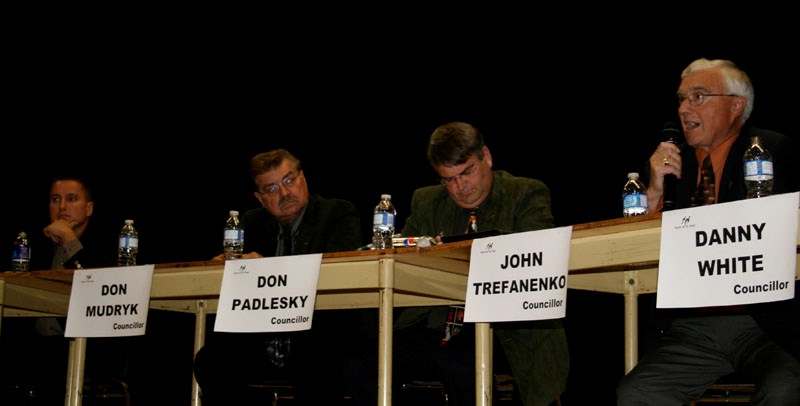Town of St. Paul residents had a chance to put their prospective councillors to the test at an Oct. 5 election forum, and many people took the opportunity to find out where the candidates stood on diverse issues such as cleaning up crime in town, attracting new business and even how they would convince more candidates, particularly young people and women, to run in future elections.
Incumbents Ken Kwiatkowski and Gary Ward were not present at the forum, but the other four councillors, Pat Gratton, Trevor Kotowich, John Trefanenko and Danny White, were in attendance, along with challengers Don Mudryk and Don Padlesky.
Some concerns centred on long discussed topics, such as the location of the medical centre, with Kotowich and White both stating they supported the committee looking at the medical centre in its decision to put the medical centre on the east end of town, and the completion of the town walking trail, which both Kotowich and Trefanenko confirmed was still on council’s radar.
A question to the challenger Don Mudryk asked, “What extra can you do for town council that the existing six have not done?” Mudryk said his goal was to be more available to ratepayers. In the past, when he’s had concerns and called councillors, none of them would return his calls. If elected, he promised to be straightforward with people who call him. “I will give you an answer or I will find an answer for you.”
When asked about a comment he’d made in the St. Paul Journal about not missing council meetings during “critical” periods, Trefanenko said he strives to attend meetings during April and December when talks on construction and strategic planning take place. He said recent communication between himself and Kotowich through the press about missed council meetings was not an ideal situation, and suggested that council should implement a self-evaluation process of itself as a governance board to avoid future clashes.
Gratton and Kotowich were asked about their views on cleaning up the town and getting rid of the vagrants and criminals. Gratton took the stage first to point out the need to work with the RCMP, and also noted that the town has a bylaw officer. He suggested that council could perhaps implement additional bylaws to clean up the town.
Kotowich agreed that the community needed to support the RCMP, but questioned what the point of enacting more bylaws would be without enforcement.
“I will continue to promote more aggressive policing,” he said, adding he was “instrumental” in bringing in the town’s first bylaw officer and would push to hire two more bylaw officers during the next term if re-elected.
Someone else posed a related question about cleaning up graffiti and garbage in town. Padlesky said he had seen RCMP getting members of the public to clean up such eyesores, which he applauded. Those who litter or paint graffiti need to face some punishment, he said, adding, ‘Let’s get them out there . . . working in the community.”
Trefanenko added that the Mannawanis Native Friendship Centre has expressed an interest in working to get rid of graffiti if the town pays for the equipment. “I think it’s a great idea.”
The fact that all of the candidates were male became a point of interest, as one young woman asked what strategies could be put in place to draw more young candidates and female candidates.
Candidates who stood to address the question, including Mudryk, Trefanenko and Kotowich, agreed that having diversity on council was important. White suggested council should get more involved in the school system, perhaps by inviting local debate teams to town council meetings, as one way to get younger people interested in politics.
In a question addressed to all candidates, someone questioned what council was doing to attract new business to St. Paul. Kotowich responded by saying council was doing its best in that regard. Town had sold lots in the hopes that new development would fill the holes in downtown, and implemented tax breaks for new businesses, with businesses locating in the downtown core receiving 100 per cent tax exemptions.
Mudryk, as a business owner, did take exception to that decision, saying that it was unfair to expect businesses who do not qualify for tax exemptions to compete with other businesses that are subsidized by the town. “I do not feel it’s in the town’s best interest to pick winners and losers,” he had said in his opening statements to the crowd, adding council must find other ways to interest businesses in locating downtown.
While new development was taking place in town, someone asked how much development town’s infrastructure could currently handle. Kotowich explained that the town undertook a flow monitoring study to assess exactly this question, and determined that all the development occurring right now can be accommodated. The development on the east end, with Sobeys, Canadian Tire and the new French school is all manageable, while infrastructure will support development on the west end as well. “Right now, we’re in good shape,” he said, adding, “we can experience a lot more growth yet.”
After questions for council candidates dried up, moderator Marvin Bjornstad summed up the evening with acknowledgements to the sponsors for the event and reminded everyone that Oct. 18, election day, was fast approaching and to vote.



